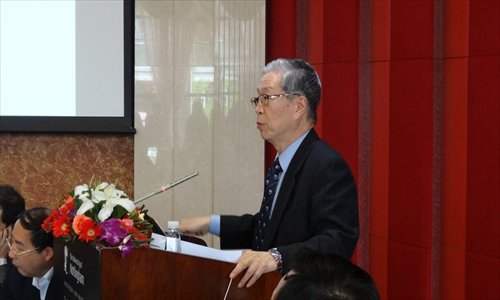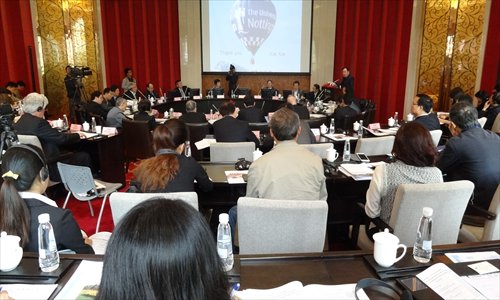HOME >> METRO SHANGHAI
Sino-foreign cooperation in academics
By Yang Lan Source:Global Times Published: 2015-5-6 17:18:01
Presidents and representatives from 47 Sino-foreign cooperative universities and institutions gathered at the University of Nottingham Ningbo China in April to attend the Sino-Foreign Cooperative University Presidents Forum, where they shared their experiences in running cooperative projects and discussed the future of cooperative education in China.
Fast and sound development
China's very first Sino-foreign cooperative university, the University of Nottingham Ningbo China (UNNC), was established in 2004 by Zhejiang Wanli University and the University of Nottingham following the 2003 Regulations of the People's Republic of China on Chinese-Foreign Cooperation in Running Schools.
The regulations encouraged high-quality foreign educational resources by renowned foreign universities to be introduced into China. It also allowed cooperatively run Sino-foreign schools to enjoy the preferential policies put in place by the State when conducting educational activities.
Eleven years on, there are now over 2,000 Sino-foreign cooperative projects in China, including 40 cooperative institutions and seven cooperative universities, totaling approximately 550,000 students. Five of the seven Sino-foreign cooperative universities are in the Yangtze Delta. They are all located in areas that have benefited from open trade and exchange with foreign countries.
Recent research conducted by Dongbei University of Finance and Economics on 13 Sino-foreign cooperative universities and institutions shows that students and parents alike are extremely content with the cooperative education model. The employment rate of graduates from these institutions is 88 percent.
"Sino-foreign cooperative universities train the kind of talent needed by multinational companies. They also train teachers using creative educational methods. Furthermore, their students only pay a quarter of the cost of studying abroad, yet they receive a bona fide international education," Cen Jianjun, director of the international cooperation department at China's Ministry of Education, said at the forum.
Pioneer in educational methods
UNNC now claims over 6,000 students and more than 600 staff from 70 countries and regions. It differs from other universities by teaching students in small groups, ensuring enough educational resources for each student. Unlike traditional classes in China, where students only listen and memorize what the teachers say, UNNC encourages students to discuss and debate topics with their teachers.
"We have the trust and support from the Chinese Ministry of Education, but we have no helicopter parents," Professor Yang Fujia, president of UNNC, told the Global Times, referring to the pejorative expression for parents who are overly involved in their children's education. "The authorities have given us enough flexibility to realize our own ideas in education."
Representatives from the Sino-foreign cooperative universities and institutions attending the forum agreed with Yang that they have been given more leeway than public universities to try innovative new educational methods and models, including designing their courses in the Western style and taking a Western approach to teacher evaluations.
United for the future
From Yang's perspective, UNNC's shortcoming is that their tuition fee is still too high. He said he ideally would like to grant all talented students the opportunity to study at UNNC, but without a scholarship he feels many students will encounter a financial barrier.
"Because Sino-foreign cooperatives are not on the list of approved universities, their students still are not eligible to receive a China National Scholarship," Professor Yang Minzhu, president of Xi'an Jiaotong Liverpool University, said at the forum.
Established in 2014, the Sino-Foreign Cooperative University Union aims to unite Sino-foreign cooperative universities and institutions to pursue their challenges and solutions together. The union believes that educational cooperatives still face many difficulties. The lack of official recognition is one such obstacle; despite their academic excellence, they are not yet allowed to be named in the lists of top universities in China nominated by the Ministry of Education. This has resulted in limitations in recruiting new students.
"We need to build a cooperative model that incorporates and combines Western insight with Chinese characteristics. Sino-foreign cooperatives should also focus on innovation. We should aim higher than just preparing students for jobs," Director Cen said.


Fast and sound development
China's very first Sino-foreign cooperative university, the University of Nottingham Ningbo China (UNNC), was established in 2004 by Zhejiang Wanli University and the University of Nottingham following the 2003 Regulations of the People's Republic of China on Chinese-Foreign Cooperation in Running Schools.
The regulations encouraged high-quality foreign educational resources by renowned foreign universities to be introduced into China. It also allowed cooperatively run Sino-foreign schools to enjoy the preferential policies put in place by the State when conducting educational activities.
Eleven years on, there are now over 2,000 Sino-foreign cooperative projects in China, including 40 cooperative institutions and seven cooperative universities, totaling approximately 550,000 students. Five of the seven Sino-foreign cooperative universities are in the Yangtze Delta. They are all located in areas that have benefited from open trade and exchange with foreign countries.
Recent research conducted by Dongbei University of Finance and Economics on 13 Sino-foreign cooperative universities and institutions shows that students and parents alike are extremely content with the cooperative education model. The employment rate of graduates from these institutions is 88 percent.
"Sino-foreign cooperative universities train the kind of talent needed by multinational companies. They also train teachers using creative educational methods. Furthermore, their students only pay a quarter of the cost of studying abroad, yet they receive a bona fide international education," Cen Jianjun, director of the international cooperation department at China's Ministry of Education, said at the forum.
Pioneer in educational methods
UNNC now claims over 6,000 students and more than 600 staff from 70 countries and regions. It differs from other universities by teaching students in small groups, ensuring enough educational resources for each student. Unlike traditional classes in China, where students only listen and memorize what the teachers say, UNNC encourages students to discuss and debate topics with their teachers.
"We have the trust and support from the Chinese Ministry of Education, but we have no helicopter parents," Professor Yang Fujia, president of UNNC, told the Global Times, referring to the pejorative expression for parents who are overly involved in their children's education. "The authorities have given us enough flexibility to realize our own ideas in education."
Representatives from the Sino-foreign cooperative universities and institutions attending the forum agreed with Yang that they have been given more leeway than public universities to try innovative new educational methods and models, including designing their courses in the Western style and taking a Western approach to teacher evaluations.
United for the future
From Yang's perspective, UNNC's shortcoming is that their tuition fee is still too high. He said he ideally would like to grant all talented students the opportunity to study at UNNC, but without a scholarship he feels many students will encounter a financial barrier.
"Because Sino-foreign cooperatives are not on the list of approved universities, their students still are not eligible to receive a China National Scholarship," Professor Yang Minzhu, president of Xi'an Jiaotong Liverpool University, said at the forum.
Established in 2014, the Sino-Foreign Cooperative University Union aims to unite Sino-foreign cooperative universities and institutions to pursue their challenges and solutions together. The union believes that educational cooperatives still face many difficulties. The lack of official recognition is one such obstacle; despite their academic excellence, they are not yet allowed to be named in the lists of top universities in China nominated by the Ministry of Education. This has resulted in limitations in recruiting new students.
"We need to build a cooperative model that incorporates and combines Western insight with Chinese characteristics. Sino-foreign cooperatives should also focus on innovation. We should aim higher than just preparing students for jobs," Director Cen said.

Yang Fujia, president of UNNC, speaks at the cooperative education forum.

Guests attend the forum as Cen Jianjun from the Ministry of Education gives a speech.
Photos: Yang Lan/GT
Posted in: Metro Shanghai